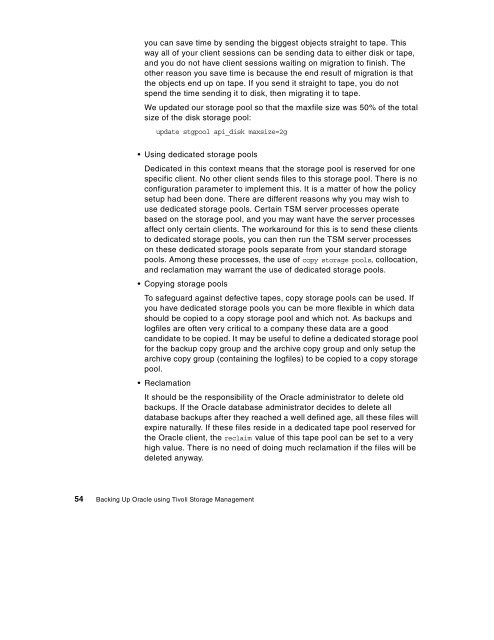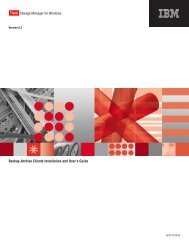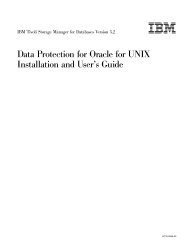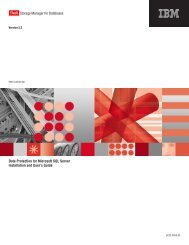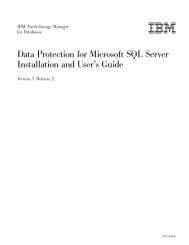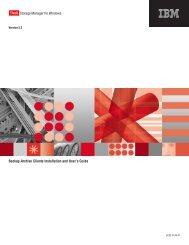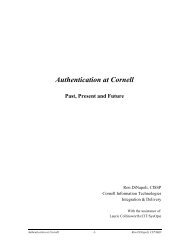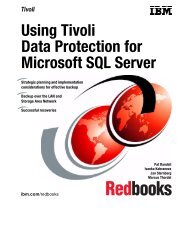Backing Up Oracle - Computing at Cornell
Backing Up Oracle - Computing at Cornell
Backing Up Oracle - Computing at Cornell
You also want an ePaper? Increase the reach of your titles
YUMPU automatically turns print PDFs into web optimized ePapers that Google loves.
you can save time by sending the biggest objects straight to tape. This<br />
way all of your client sessions can be sending d<strong>at</strong>a to either disk or tape,<br />
and you do not have client sessions waiting on migr<strong>at</strong>ion to finish. The<br />
other reason you save time is because the end result of migr<strong>at</strong>ion is th<strong>at</strong><br />
the objects end up on tape. If you send it straight to tape, you do not<br />
spend the time sending it to disk, then migr<strong>at</strong>ing it to tape.<br />
We upd<strong>at</strong>ed our storage pool so th<strong>at</strong> the maxfile size was 50% of the total<br />
size of the disk storage pool:<br />
upd<strong>at</strong>e stgpool api_disk maxsize=2g<br />
Using dedic<strong>at</strong>ed storage pools<br />
Dedic<strong>at</strong>ed in this context means th<strong>at</strong> the storage pool is reserved for one<br />
specific client. No other client sends files to this storage pool. There is no<br />
configur<strong>at</strong>ion parameter to implement this. It is a m<strong>at</strong>ter of how the policy<br />
setup had been done. There are different reasons why you may wish to<br />
use dedic<strong>at</strong>ed storage pools. Certain TSM server processes oper<strong>at</strong>e<br />
based on the storage pool, and you may want have the server processes<br />
affect only certain clients. The workaround for this is to send these clients<br />
to dedic<strong>at</strong>ed storage pools, you can then run the TSM server processes<br />
on these dedic<strong>at</strong>ed storage pools separ<strong>at</strong>e from your standard storage<br />
pools. Among these processes, the use of copy storage pools, colloc<strong>at</strong>ion,<br />
and reclam<strong>at</strong>ion may warrant the use of dedic<strong>at</strong>ed storage pools.<br />
Copying storage pools<br />
To safeguard against defective tapes, copy storage pools can be used. If<br />
you have dedic<strong>at</strong>ed storage pools you can be more flexible in which d<strong>at</strong>a<br />
should be copied to a copy storage pool and which not. As backups and<br />
logfiles are often very critical to a company these d<strong>at</strong>a are a good<br />
candid<strong>at</strong>e to be copied. It may be useful to define a dedic<strong>at</strong>ed storage pool<br />
for the backup copy group and the archive copy group and only setup the<br />
archive copy group (containing the logfiles) to be copied to a copy storage<br />
pool.<br />
Reclam<strong>at</strong>ion<br />
It should be the responsibility of the <strong>Oracle</strong> administr<strong>at</strong>or to delete old<br />
backups. If the <strong>Oracle</strong> d<strong>at</strong>abase administr<strong>at</strong>or decides to delete all<br />
d<strong>at</strong>abase backups after they reached a well defined age, all these files will<br />
expire n<strong>at</strong>urally. If these files reside in a dedic<strong>at</strong>ed tape pool reserved for<br />
the <strong>Oracle</strong> client, the reclaim value of this tape pool can be set to a very<br />
high value. There is no need of doing much reclam<strong>at</strong>ion if the files will be<br />
deleted anyway.<br />
54 <strong>Backing</strong> <strong>Up</strong> <strong>Oracle</strong> using Tivoli Storage Management


